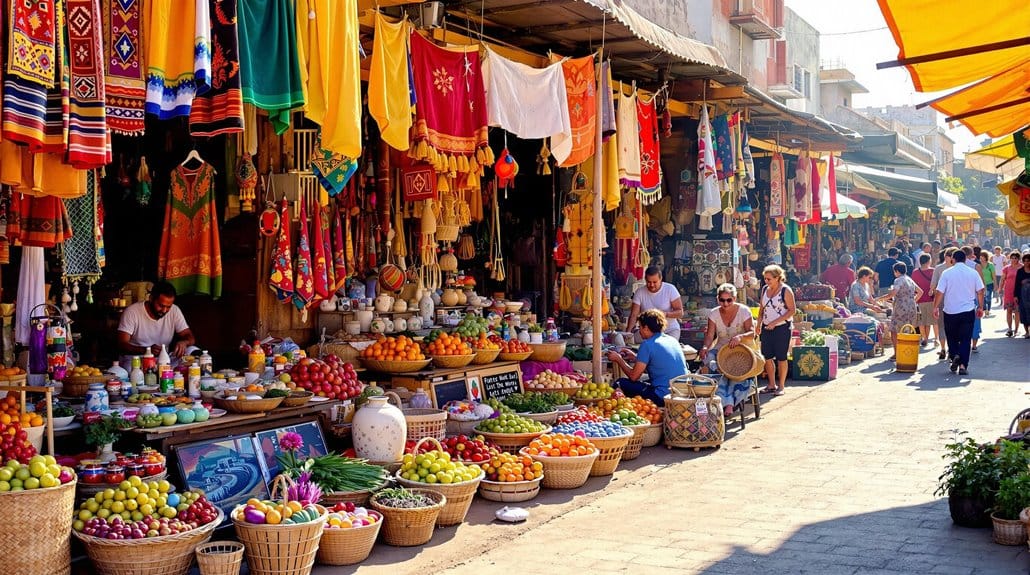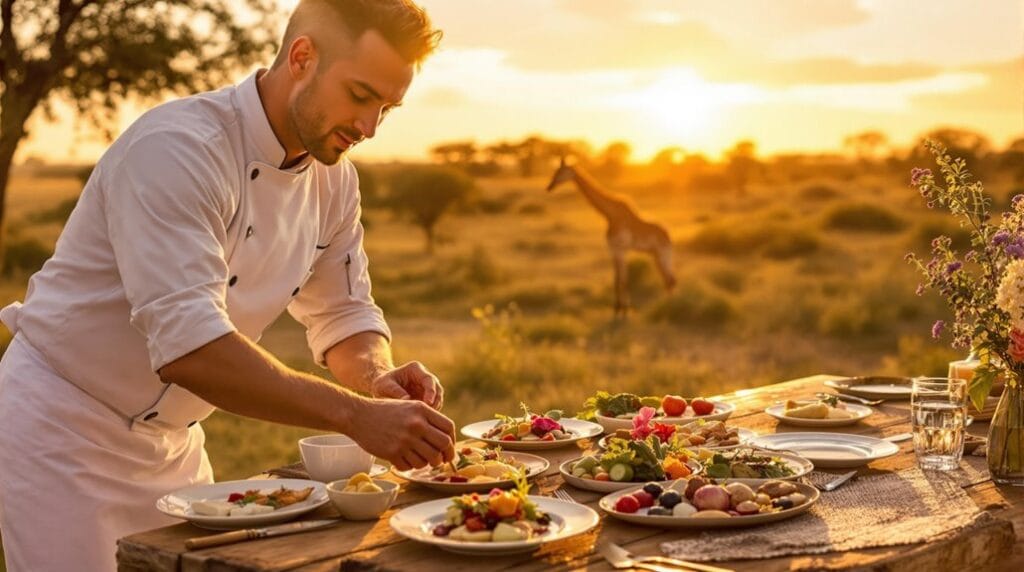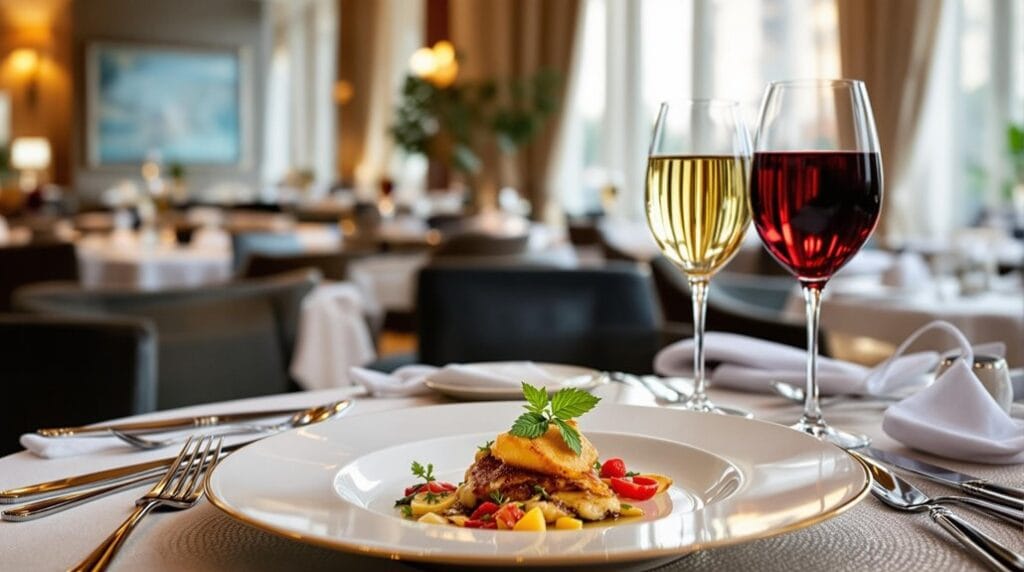Stepping into Africa's local food and craft markets feels like entering a vibrant canvas, splashed with colors, scents, and sounds that tell a story of rich tradition. You'll encounter artisanal crafts that echo the heritage of their makers and culinary delights that awaken your taste buds. Each interaction with a vendor offers a glimpse into their world, revealing the cultural significance behind every item. But what hidden gems and unique experiences await you in these bustling hubs? Exploring these markets could lead to discoveries that redefine your understanding of Africa's diverse cultures.
Key Takeaways
- Explore diverse culinary landscapes by sampling traditional staples like yams, plantains, and exotic fruits at local markets.
- Engage with vendors to learn about the cultural significance of their handcrafted goods and unique spices.
- Experience authentic local flavors by trying street food and participating in haggling for better deals.
- Visit vibrant markets like Makola and Wazobia for a rich selection of fresh produce and artisanal products.
- Utilize the Evendo app for personalized recommendations and tips to enhance your market experience.
Importance of African Markets
African markets are more than just places to shop; they're vibrant cultural hubs that connect communities and preserve local traditions. When you walk through these bustling markets, you'll find a rich tapestry of colors, sounds, and scents, all woven together by the stories of local artisans who proudly showcase their handcrafted goods.
Each stall offers unique products, from traditional staples to intricate crafts, ensuring you experience the essence of Africa's rich cultural heritage.
These markets are vital for maintaining ties to home, especially for African students and expatriates. You'll savor familiar tastes and discover culinary delights that remind you of family gatherings and celebrations.
The vibrant atmosphere invites cultural exchange, allowing you to engage with the community and learn about the significance of each item you encounter.
Moreover, by promoting local entrepreneurship, these markets play an important role in enhancing the economic and social fabric of their communities. Supporting local artisans empowers them and fosters a sense of belonging, making you feel part of a larger narrative.
Top African Markets Near Rice University
If you're looking to explore authentic African flavors, the markets near Rice University offer a treasure trove of unique products that you won't find anywhere else.
From fresh ingredients at Makola Market to specialty spices at Dominion African Food Mart, each stop invites you to experience a rich cultural exchange.
These markets not only cater to your culinary needs but also connect you to the vibrant traditions and tastes of Africa.
Unique Product Offerings
When you step into the vibrant atmosphere of local markets near Rice University, a world of unique product offerings awaits you. Each market has its own charm, showcasing a treasure trove of authentic African goods.
At Makola Market, just 12 miles away, you'll discover an extensive selection of traditional staples like grains and spices that reflect the diverse cultures of Africa.
Motherland African Food Market & Halal Meat, located 13 miles from campus, caters to various dietary needs, featuring halal meats alongside everyday groceries.
For those seeking fresh and frozen foods, Dominion African Food Mart, 16 miles from Rice, specializes in flavorful spices that capture the culinary richness of the continent.
Wazobia African Market, known for its quality and affordability, offers a range of fresh produce and essential ingredients, making it a must-visit.
Finally, G & J African Market, 25 miles away, stands out with its obscure ingredients, perfect for culinary enthusiasts keen to explore unique flavors.
These markets in this vibrant city invite you to immerse yourself in a culinary adventure, bringing the taste of Africa closer to home.
Cultural Exchange Opportunities
Stepping into the bustling atmosphere of local markets near Rice University opens up a world of cultural exchange that enriches your experience. At places like Makola Market and Motherland African Food Market, you'll find a vibrant community where traditional African food and products abound.
These markets serve as cultural hubs, inviting you to engage with vendors and fellow shoppers, all while savoring authentic dishes that reflect Africa's rich tapestry.
As you explore, you'll encounter unique spices and handcrafted items, each with its own story. Engaging with staff can deepen your understanding of African culture and traditions, creating a shared cultural experience.
Don't be surprised if some vendors may not accept credit cards—embracing cash transactions can lead to meaningful interactions and insights about the products you're purchasing.
Whether you're part of the African diaspora or a curious local, these markets promote cultural diversity and community engagement in the Houston area.
Market Exploration Tips
Exploring the vibrant tapestry of local food and craft markets in Africa can be an unforgettable adventure, bursting with flavor and culture. To make the most of your experience, consider these market exploration tips.
First, visit multiple markets to uncover a variety of unique products that reflect Africa's diverse culinary landscape. Each market has its own charm and specialties waiting for you to discover.
Engage with staff and fellow shoppers—don't be shy! They can offer insights and recommendations on the best items to try or purchase. Focus on sourcing fresh produce like yams and plantains, which are staples in African cuisine and often boast the best flavor and quality.
Embrace the sensory experience; take in the vibrant sights, aromatic smells, and diverse tastes that each market offers. Interacting with vendors not only enhances your shopping experience but also allows you to learn the stories behind their products, enriching your understanding of their cultural significance.
Cultural Significance of Markets
When you step into an African market, you're not just shopping; you're connecting with a vibrant tapestry of community traditions and culinary heritage.
Each stall tells a story, showcasing local crafts and flavors that reflect the heart of the culture.
Community Connection Through Markets
Markets in Africa pulse with life, serving as vibrant cultural hubs that deepen community connections. They're not just places to buy and sell; they're where you can experience the rich tapestry of local culture and traditions.
You'll find artisans proudly showcasing their crafts, preserving the heritage that binds communities together. These markets foster a sense of belonging, especially for those from the diaspora, by offering familiar foods and products that evoke cherished memories.
Participating in these lively gatherings, you'll witness:
- Festivals that celebrate shared cultural practices
- Artisan stalls that highlight local craftsmanship
- A welcoming atmosphere that encourages friendly interactions
- Diverse groups coming together in unity and joy
As you stroll through the bustling aisles, the vibrant colors and enticing aromas wrap around you like a warm embrace. Each interaction—whether with a vendor or another shopper—reinforces friendships and strengthens community ties.
These experiences not only enrich your understanding of African culture but also create lasting connections that resonate long after you leave the market. Embrace the vibrant spirit of these communal spaces, and let them deepen your sense of belonging.
Preserving Cultural Heritage Through Food
The vibrant atmosphere of African markets is steeped in culinary traditions that play an essential role in preserving cultural heritage. As you wander through these lively spaces, you'll encounter an array of unique products—from fragrant spices to intricate handcrafted items—each telling a story of local customs and histories.
Engaging with vendors offers you a chance to dive deeper into these narratives, learning about the techniques behind traditional crafts and the significance of the flavors that define each region.
Through your food experiences in these vibrant markets, you'll not only reconnect with familiar tastes but also participate in a beautiful exchange of cultures. Each bite and each conversation helps foster a sense of belonging, as you share meals and stories with diverse communities.
Events and festivals in and around these markets celebrate local traditions, reinforcing community ties and ensuring that cherished practices endure for future generations.
Overview of Farmers Market Zanzibar
Nestled in the heart of Paje, Zanzibar, the Farmers Market Zanzibar bursts with life every Saturday from 11 AM to 5 PM. As you step into this vibrant atmosphere, you'll be captivated by the array of fresh produce, exotic fruits, and aromatic spices.
The market not only showcases Zanzibari agricultural heritage but also reflects the lively spirit of the local community. You'll find friendly vendors enthusiastic to share stories about their products, enhancing your cultural experience. Engaging with them makes you feel like part of something bigger, a connection to the land and its people.
To make the most of your visit, consider these tips:
- Arrive early for the freshest produce.
- Explore the handcrafted items available for purchase.
- Don't forget to bring cash, as many vendors don't accept credit cards.
- Immerse yourself in the rich scents and flavors that define Zanzibar.
At the Farmers Market Zanzibar, you're not just shopping; you're part of a vibrant tapestry of life in this beautiful island community. Enjoy the sights, sounds, and flavors that make this market an unforgettable experience!
Local Tips for Visitors
Visiting local food and craft markets in Africa can be an exhilarating experience, full of sensory delights and unique cultural encounters. To make the most of your adventure, here are some local tips.
Arrive early to snag the freshest produce and avoid the bustling crowds. This way, you can leisurely explore the vibrant stalls at your own pace.
Don't shy away from street food—sampling local delicacies not only enhances your experience but also introduces you to new flavors that you'll cherish.
When shopping, engage in haggling; it's expected and adds a fun element to your transactions. You might score a better deal while connecting with the vendors.
Make sure to carry cash, as most vendors prefer it over credit cards. Having small denominations will keep things smooth and efficient.
Finally, take the time to chat with artisans and vendors. They're often enthusiastic to share the stories behind their crafts, which adds a personal touch to your visit.
Embrace the lively atmosphere, and you'll leave with not just souvenirs but cherished memories of your time in these vibrant markets.
Experience at Farmers Market Zanzibar
At the Farmers Market Zanzibar in Paje, you're greeted by a kaleidoscope of colors and aromas that instantly draw you in. Every Saturday, from 11 AM to 5 PM, this vibrant market comes alive, inviting you to explore the rich agricultural heritage of Zanzibar.
As you wander through the stalls, you'll discover:
- Exotic fruits bursting with flavor
- Aromatic spices that tantalize your senses
- Handcrafted items showcasing local artistry
- Friendly vendors enthusiastic to share their stories
Sampling delicious local delicacies enhances your culinary adventure, giving you a true taste of Zanzibari cuisine.
Don't shy away from engaging with the vendors—they're not just selling products, but sharing a piece of their culture and passion. You might even find yourself haggling for the best deals, a common practice that adds to the lively atmosphere.
Remember to bring cash, as it's preferred for transactions.
The Farmers Market Zanzibar isn't just a marketplace; it's a vibrant community hub where you can connect with locals, embrace their traditions, and savor the essence of this beautiful island.
Transportation Options
How do you plan to navigate the bustling markets of Africa? To truly immerse yourself in the vibrant atmosphere, consider your transportation options.
In cities like Zanzibar and Lagos, public transport options such as minibuses, known as Daladala, offer an affordable ride for just about TZS 2,000 (~$1). If you prefer comfort, taxis are a great choice, though it's wise to agree on a fare of around $40-50 before you hop in.
For a unique experience, why not rent a bicycle? This allows you to soak in the local scenery as you pedal your way to places like Stone Town, which can take 2-3 hours.
If you're driving, rest assured that parking is available near popular markets like Bay Harbour Market in Hout Bay.
To make your journey smoother, don't forget to download apps like Evendo. They can help you find directions and book tours tailored to your interests, making your visit even more enjoyable.
With these options at your fingertips, you're set to plunge into the heart of Africa's bustling markets.
Travel Guide Resources
Steering through Africa's vibrant local food and craft markets becomes even more enjoyable when you have the right travel guide resources at your fingertips. One standout option is the Evendo app, a free app-based travel guide that's designed to enhance your market visits. With its user-friendly interface, you can easily navigate and plan your adventures, ensuring you don't miss a beat.
Here's what you can expect when using Evendo:
- Detailed insights on local restaurants, shops, and cultural sites
- Travel tips and recommendations from fellow explorers, uncovering hidden gems
- Comprehensive coverage of neighborhoods to help you immerse yourself in local culture
- Attractions to explore, tailored to your interests in each market
With Evendo, you'll not only find essential information but also feel connected to the vibrant community around you.
As you explore attractions and indulge in local flavors, this travel guide resource will empower you to create authentic experiences in Africa's bustling markets. Embrace the adventure and let the Evendo app be your companion on this unforgettable journey!
Frequently Asked Questions
What Are the Best Times to Visit Local Markets?
To enjoy the local markets, visit during peak visiting seasons, typically weekends or holidays. Check market opening hours and align your trip with local festival schedules for a lively, authentic experience filled with culture and community.
Are There Any Entry Fees for These Markets?
When it comes to entry fees, you'll find most local markets don't charge, making them accessible. However, check local regulations, as some special events may require a small fee due to their cultural significance.
Is Bargaining Acceptable When Purchasing Items?
Bargaining's not just acceptable; it's part of the cultural significance in markets. Understanding bargaining etiquette enhances your experience, reflecting market dynamics. Immerse yourself, engage with vendors, and embrace this lively exchange for a richer connection!
What Types of Payment Methods Are Commonly Accepted?
When you're shopping, you'll find cash transactions, mobile payments, and currency exchange are commonly accepted. Whether you're carrying notes or tapping your phone, there's always a way to bring home that perfect find.
Can I Find Vegetarian or Vegan Options at These Markets?
You'll discover plenty of vegetarian dishes and delicious vegan snacks at these markets. Vendors use fresh local ingredients, ensuring vibrant flavors. You'll feel welcome exploring diverse options that cater to your dietary preferences and cravings.
Conclusion
So, as you stroll through these vibrant markets, dodging enthusiastic vendors and the occasional rogue chicken, you'll realize that Africa's local food and craft scenes aren't just about shopping; they're a whirlwind of flavors and stories. Forget sterile supermarkets with their bland aisles—here, every corner bursts with life! Embrace the chaos, savor the spices, and immerse yourself in the culture. You might even leave with a unique souvenir or two, and a few new friends (or chickens) along the way!









